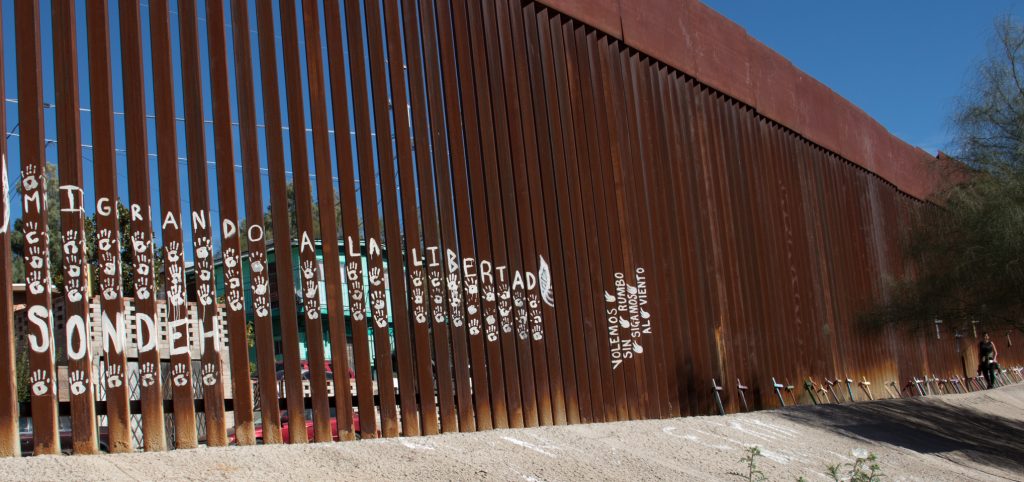Bearings
Bearing Witness at the Border
People of Faith Welcoming Strangers to a Hostile America
By Elizabeth Drescher
September 2019 Issue

Coming back from what seems to be an increasingly shorter summer hiatus, we often incline to focus Bearings on somewhat more congenial concerns by way of ramping into a publication season that we know will face its share of challenges. But this time around, living in the world we all inhabit together, that didn't seem to the responsible way to go. That doesn't mean it was easy to define a theme for our opening issue, what with the planet itself on a 20-year path to a point of climatic no return, the U.S. government contributing with frightening generosity to a global undermining of democracy and freedom, an election season offering equal measures of hope and anxiety, gun violence stoking fear across the populace and political indifference on an almost weekly basis. On less trafficked parts of streets in my relatively affluent Silicon Valley neighborhood, people regularly live out of cars, part of an epidemic of homelessness that plays out across the country. Have I missed anything? Surely I have. As our publication season extends into early next summer, our contributors will delve into all of these vexing topics and more for people of faith and their communities, offering characteristic wisdom, wit, challenge, and inspiration.
In this issue, however, we consider the complex subject of immigration as it is engaged by people in various, interrelated modes of ministry, lay and ordained, congregational and community, pastoral and academic, activist and artistic. It's not an easy topic, of course. And, for those readers further from the most recognizable and controversial centers of migration and detention, other troubles can readily take priority. Climate. LGTBTQ civil rights. Gun violence. Homelessness. We get it. We're glad so many of us are focused on so many different ways of helping to bring about the Kingdom across the U.S. and the globe. But we also see immigration—the status of the alien, the stranger, the migrant—as in many ways the foundational justice concern of those affiliated or associated with Abrahamic religions. From the Hebrew Bible to the Christian Gospels and Epistles, care for those on the margins of society, those displaced from their homelands, those with no country to call their own is a defining concern. Indeed, the very notion in Christian teaching of bringing about "the Kingdom of God," of all finding refuge in the "many dwelling places" of God's home is what largely defines the idea of salvation, of paradise. So, we begin our journey together this publication season on the road, on the border, in the margins, behind the wall.

An amazing collection of contributors guides us on this initial journey. With priest and activist Robin Denney and young people from her congregation, we travel to El Salvador in "Nurturing a New Generation of Immigration Activists in the Church." Pastor and professor Ralph Basui-Watkins' "Ministry, Marriage, and Immigration" offers a more intimate portrait of how the often invisible reality of immigration shapes families and how it has informed his ministry. Complementing these two Features, a trio of Episcopal priests and immigrant advocates—Anthony Guillén, Al Rodriguez, and Francisco García—offer powerfully challenging Commentary, "Can the Church Welcome the Stranger without Challenging Mainline Christian Whiteness?," on the enduring ideology of whiteness as it limits the ability of mainline churches to stand in solidarity with immigrants, migrants, and refugees.
In our Creative Insights section, the poet and activist Viktoria Valenzuela shares a collection of poems from remarkable writers who founded and participate in the activist art communities 100 Thousand Poets for Change and Poets Against Walls in San Antonio, Texas. Viktoria's "Speaking with One Heart" includes wrenching, inspirational, troubling, and hope-filled work from Texas Poet Laureate, Emmy Peréz, as well as from the writers, educators, activists, and organizers Marisela Barrera, César De León, Carolina Monsiváis, and Rodney Gomez. To enter into this blessing of poetic and prophetic vision is to feel day-to-day experience on the border from the heart.
Finally, we've reached back to our archives for a piece that retired UCC pastor Janet Dorman offered way back in 2016, "What the Parrots of Telegraph Hill and Other 'Invasive Species' Can Teach the Church," as the anti-immigrant rhetoric that is now the lingua franca of much of America was just beginning to circulate.
As in other publication years, this one begins with change—personnel rather than platform in this year. As most readers know, The BTS Center has a new Executive Director in the person of The Rev. Allen Ewing-Merrill. You'll hear Allen's voice directly in Bearings soon, but he's also very much behind the particularly pronounced focus on social justice you'll see this year. Likewise, a new Editorial Assistant, Kate Soifer, a sophomore majoring in anthropology, with a concentration in primatology, and a minor in art history, will be joining us for the October issue. We're grateful for both new collaborators as we enter year six of Bearings publication, and, as always, we're so glad you're walking with us as well.
Photo Credits:
Liana De Laurent De Laurent, "The All-Seeing Eye" (April 23, 2019). Via Unsplash. CC0 license.
Photo #1: Peg Hunter, "Border Wall from the Mexican Side" (November 14, 2017). Via Flickr. CC2.0 license.

